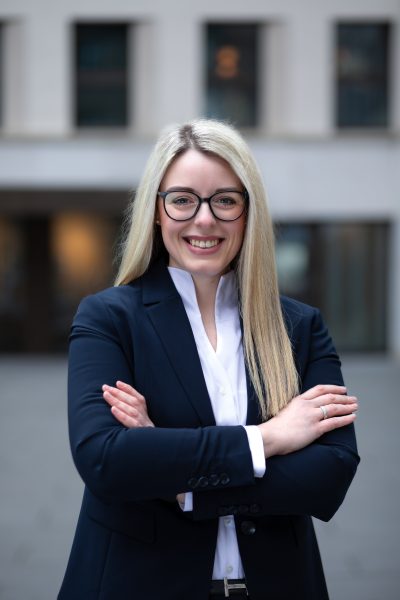My experience report on the Bachelor's and Master's degree program at Allensbach University

My starting point and motivation for studying
My name is Sabrina Dulgeridis. I have been working in the financial sector for over 15 years and am currently responsible for the areas of board secretariat and customer quality management with a focus on corporate development at a cooperative bank. During this time, I have gained extensive experience in organization, leadership and quality management. Early on in my career, it was important to me not to stand still, but to continuously develop myself further - professionally, personally and academically.
That's why I completed my Bachelor's degree at Allensbach University while working. This experience has shown me impressively: If the framework conditions are right, much more is often possible than you initially think is realistic. With this success behind me, I quickly decided to take the next step and tackle my Master's degree - without taking a career break and without compromising on my job.
My motives
I initially looked at many alternatives - from traditional face-to-face universities to distance learning universities and private providers. In the end, however, the decision was clear, especially because I had already completed my Bachelor's degree. Why Allensbach University?
- Maximum flexibility: Study when and where it suits me. Not a rigid corset, but a study model that adapts to my life - not the other way around.
- State-recognized & internationally accredited: For me, it was crucial that the degree didn't just "sound good", but had real relevance for my career and development.
- Personal closeness despite distance: Even during my Bachelor's degree, I experienced how individual, fast and uncomplicated the support is. This feeling of not just being a number, but a person, was ultimately the deciding factor for me.
Learning, experiencing, growing - my studies
Of course, studying wasn't a sure-fire success - and that's exactly what made it exciting. On average, I invested 10 to 15 hours a week, sometimes in the evening, sometimes at the weekend. My personal system was crucial: fixed study times, small milestones and the motivation to be able to apply my knowledge directly in my everyday working life.
The study materials also proved to be modern, well thought-out and varied: structured scripts, interactive content, videos and practical exam formats. I particularly appreciated the variety of exams - from written exams to term papers and presentations.
I will never forget the moment when I completed my most extensive academic work to date - at a time when I was particularly busy both professionally and privately. At first I had the feeling that there simply wasn't enough time and sometimes I didn't know where and how best to start. But this is exactly where the value of a clear study architecture and reliable support became apparent: I was able to work my way through the content step by step, received prompt feedback and finally managed to submit the thesis even earlier than planned. This experience impressively showed me that discipline is important - but clear structures and reliable support from the private environment as well as the university and its supervisors are just as important.
What I have achieved
I am now in the final stages of my Master's thesis. My average grade improved from module to module - a clear sign that I had found my learning rhythm.
However, perhaps the greatest benefit of the course became apparent long before I graduated: the content could be transferred directly into my day-to-day work. Whether it was process optimization, leadership or the noticeable increase in customer quality - I was able to apply a lot of it directly. As a result, my area of responsibility and my role in the bank grew, and decisive career steps such as promotion to department head were initiated at an early stage.
Objections, doubts and hurdles
Of course, it wasn't always easy - the biggest challenge here was also the time factor. Balancing a full-time job, studies and private life requires discipline and clear priorities. My solution was to treat fixed study times like binding business appointments and consistently not allow myself to be distracted. Looking back, I would give myself an even clearer structure for the start in order to organize exam phases more evenly and avoid peak workloads.
What I would like to give prospective students
My conclusion: It works - if you want it to!
Three tips for anyone considering this route:
- Block time: Treat learning times like fixed appointments - as binding as meetings or sport.
- Plan early: A clever sequence of modules reduces stress in the examination phases.
- Use the network: Lecturers and study support are not only available, but also quick, committed and approachable at all times - take advantage of this support!
Have the courage to follow your path - it will not only lead you to graduation, but to new strength, self-confidence and real opportunities.
Sabrina Dulgeridis
